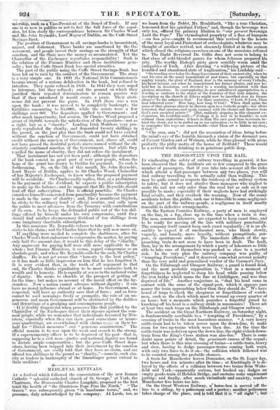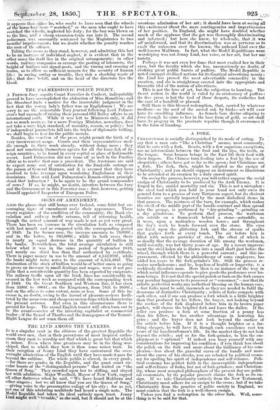THE BLOOD-STAIN l/PON THE RAIL.
IN vindicating the safety of railway travelling in general, it has been observed that the accidents are so few compared to the gross number of passengers, that if you take into account all the risks which attend a foot-passenger between any two places you will find railway travelling to be actually safer than walking. This may be quite sound as respects the tendency of the railWay system to safety, but it does not absolve those managers who neglect to make the rail not only safer than the road but as safe as it can possibly be made; especially if their neglects have had strikingly fatal results, and they overlook the warning. Now of the many accidents before the public, each one traceible to some negligence on the part of the railway-people, a negligence in itself mostly traceable to defective arrangements. On the Eastern Counties Railway, a party of men is employed on the line, in a fog, close up to the, time when a train is due. The men, common labourers, are expected to keep exact time, and to be ready for moving off_ the line with military punctuality. The company itself cannot keep such exact regularity ;, it is an ab- surdity to expect it of - uneducated men, who think slowly, vaguely, and loosely, move heavily, without promptitude, pur- pose, or spontaneous order. The immediate officers of the ap- proaching train do not seem• to have been in fault. The fault, then, lay in the ment by which a party of labourers so little able 'to take care ofwas pushed so close to a mortal risk. In the very plan the railway company was guilty. of "tempting Providence," and it deserved somewhat severer penalty than the very mild and generalized verdict of the Coroner's Tury. On the Edinburgh and -Glasgow Railway, a guard is foimddead; and the most probable supposition is, "that in a moment of forgetfulness he neglected to stoop his head while passing below the iron bridge which spans the line at Linlithgow, and was thus deprived of life." Another conjecture is, "that his head came in contact with the arms of the signal-post, which it appears pass nearer the train approaching below than they should do." We have heard of traps to check the sleepiness or forgetfulness of watch- men, such as the clock which must be wound up every quarter of an hour; but a memento which punishes a forgetful --griard by knocking off his head is a railway stride in mnemonics ! .. There are at least two such traps on the Edinburgh and Glaspw railway. The accident on the Great Northern Railway; on Saturday night, is fundamentally ascribable to a " tempting of Providence," by a crossing of trains in the most hazardous manner. "A very heavy cattle-train had to be taken across upon the down-line, to make room for two up-trains which were then due. At the time the ! cattle-train was so driven upon the down-line, the eight o'clock down- train from the King's Cross station was also due." There is some doubt upon points of detail, the proximate causes of the sequel ; but when there is this nice crossing of trains—a cattle-train, heavy and slow, having to dodge passenger-trains coming both ways, with only two lines to do it on—the collision which followed was to be counted among the probable chances. A train for Manchester leaves Doncaster, on the St. Leger day, two hours and ten minutes after its time ; at Knottingly it is de- s layed by the effects of a collision between two trains from Wake- field and York—apparently serious, but hushed up; ; dodges an empty goods-train- at Hebden Bridge, and sustains some unpleasant Marrmg ; and. finally, after much vicissitude and anxiety, reaches anchester five hours too late. On the Great Western Railway, horse-box is moved off the line to a siding, by a policeman and a porter ; another policeman takes charge of the place, and is told that it is " all right " ; but it appears that ...idea- he, who ought to have seen that the wheels of the horse-bo were " scotched," or the man who ought to have scotched' the wItsels, neglected his duty; for the box-was blown on to the line, and a cheap excursion-train ran into it. The second policeman was. summarily sentenced by the Magistrates to two months imprisonment; but we doubt whether the penalty reaches the root of tie-, offence.
Taking the cases as they stand, however, and admitting this last to be an instance of .individual neglect, it is evident that in the other cases the fault lies in the original arrangements : in other words, railway companies so arrange the posting of labourers, the height of bridges and signal-posts, and the timing and crossing of trains, as to allow no sufficient margin for the security of human life : in saving outlay or trouble, they risk a shocking waste of life ; that does befall, and on the head of the directors lies the blood.



























 Previous page
Previous page